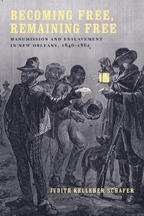
232 pages / 6.00 x 9.00 inches / no illustrations
History / United States - Southern History
For more than 150 years, the tales of hundreds of slaves and free people of color who used the judicial system to negotiate their freedom lay buried deep within the dusty records of the New Orleans district courts. Then Judith Kelleher Schafer spent fourteen years poring over Minute Books and trial transcripts, uncovering for the first time the details of these fascinating cases, which spanned from the creation of New Orleans’s five district courts in 1846 to the Union occupation in 1862. In Becoming Free, Remaining Free, Schafer presents her findings and offers a profound analysis of slavery and manumission in the Crescent City.
Louisiana state law was unique in allowing slaves to contract for their freedom and to initiate a lawsuit for liberty. Schafer describes the ingenious and remarkably sophisticated ways slaves used the legal system to gain their independence and find a voice in a society that ordinarily gave them none. Some sued on the basis that they had gained freedom by traveling to countries that outlawed slavery. Others contended that their owners had manumitted them in wills or that they had purchased themselves in deals on which their owners reneged. Their success rate was so great that in 1857, facing pressure arising from the increase in the number of free people of color, the state legislature prohibited manumission.
Schafer also recounts numerous cases in which free people of color were forced to use the courts to prove their status, showing that remaining free was often as challenging as becoming free. She further documents seventeen free blacks who, when faced with deportation, amazingly sued to enslave themselves rather than leave family, friends, property, and home. Throughout the book, her trial descriptions and personal profiles offer a vivid portrait of the gritty, everyday workings of the New Orleans legal scene and the underside of antebellum lawyering.
Schafer’s impressive detective work achieves a rare feat in the historical profession — the unveiling of an entirely new facet of the slave experience in the American South. Though her focus is on New Orleans, her stories speak volumes about the universal human desire for freedom. With a rich bibliography sure to ease future research, Becoming Free, Remaining Free is a milestone in the historiography of slavery.
Excerpt from the Book
Sometimes people of color languished in jail for months and even years before being released as free. Perhaps the most outrageous instance of confinement of free persons to prove their status involved the case of Betsey Doubeval and Judy Wyereau, whom police arrested for claiming to be free, but having no evidence of freedom. Their arrest had occurred on 26 November 1851. A newspaper article in 1859 commented that “no one being particularly interested in these women, they have remained in custody from the day of their confinement to the present time. They are both aged and of meek and peaceful demeanor. Efforts have been made lately to trace out their history, and it appears that the parties who knew the fact of their freedom, and who would have intervened for their protection, are all dead. The Recorder, leaning to the side of humanity, discharged them without entering into the question of their status. One of them immediately found a home, being taken as a servant in the family of a gentleman.” In a rush of pro slavery sentiment, the Daily Picayune commented: “She seemed delighted to have one who would again stand to her in the relation of master and protector.”
Found an Error? Tell us about it.